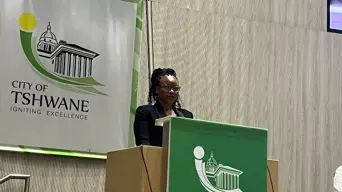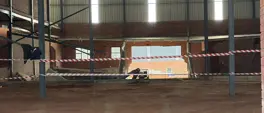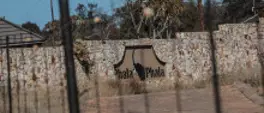Tshwane mayor, city manager could face jail time if they fail to provide services at Tshwane Fresh Produce Market
Thabiso Goba
12 August 2025 | 11:07On Sunday, the Gauteng High Court handed down an order finding the Tshwane Municipality guilty of contempt of court.

Tshwane Mayor Nasiphi Moya. Picture: Thabiso Goba/EWN
JOHANNESBURG - The mayor and city manager of the Tshwane Municipality could face one month in prison, should they fail to comply with a court judgment ordering the capital to provide services at the Tshwane Fresh Produce Market.
On Sunday, the Gauteng High Court handed down an order finding the Tshwane Municipality guilty of contempt of court.
The ruling found the city had failed to comply with a court order handed down on 31 October 2022 relating to the city’s responsibility to maintain and upgrade the market.
In her ruling, Judge Mmonoa Teffo ordered the mayor and city manager to be imprisoned for one month, suspended for one year on condition they ensured the municipality complied with the October 2022 order within 30 days of the latest judgment.
The current mayor, Nasiphi Moya, was not in the position on the day of the order; it was Randall Williams from the Democratic Alliance (DA).
Meanwhile, the current city manager, Johan Mettler, was only hired in September 2022, a few days before the court order was granted.
In January 2022, the Institute of Market Agents of South Africa (IMASA) brought an application against the Tshwane Municipality for failing to provide services in the fresh produce market, as it was constitutionally mandated to.
The municipality also accepted its shortcomings.
As a result, in October 2022, a consent order was granted by the Gauteng High Court.
Both parties said that the municipality would use its R18 million budget for the 2022/2023 financial year allocated to the market to address the challenges raised.
The municipality was ordered to submit a draft precinct risk assessment and recovery plan within 60 days and the final version of it within 180 days.
The plans should detail the municipality’s strategy in making the market fire and smoke detection compliant, ensuring their electricity connectivity, security and checkpoint management.
The municipality plan also included the purchases of evaporator coils, ensuring lift and hoist facility compliance, repairing all damaged sanitation facilities and conducting refuse removal.
The municipality was also ordered to consult IMASA with all budget processes related to the Tshwane fresh produce market.
In court papers, the municipality submitted its draft precinct plan on 30 December 2022.
However, IMASA wrote back to the municipality, saying the draft was non-compliant with the court order.
IMASA said the municipality did not provide details and projections of how R18 million budget would be used.
The municipality also did not provide supporting documents for IMASA has to compare or verify the information contained in its precinct plan.
While still discussing the alleged non-compliance of the draft plan, on 28 April 2023, the Tshwane Municipality sent a final precinct plan to IMASA, without addressing the concerns raised.
On 10 August 2023, the municipality wrote to IMASA, stating it had complied with the timeframes set out by the court.
Aggrieved by this, IMASA subsequently instituted this contempt of court case against the municipality in December 2023.
"The contents of the plans do not prioritise the problems that need to be attended to in terms of the previous order," said IMASA in its court papers.
In its responding affidavit, the municipality said IMASA was seeking information beyond what was set out in the court order.
The municipality also maintained it utilised a majority of R18 million budget. However, Judge Teffo found that the city could not provide sufficient details on how it spent the money.
The municipality said IMASA was misguided in thinking the court order allowed it "micromanage" the implementation of the precinct plan.
The municipality acknowledged that it had differing views on interpretation of the October 2022 court order with IMASA.
Judge Teffo wrapped the city over the knuckles for acknowledging it had differing views with IMASA on the interpretation of the October 2022 court order; however, it did not take initiative to seek clarity from the court.
"The interpretation proffered by the first respondent [municipality] that it was not directed to provide the applicant [IMASA) with information it requested is not sensible and businesslike. It will, in my view, under the purpose of the previous [October 2022] court order," said Teffo.
The municipality submitted to court that electrical connectivity was not possible in the 2022/23 year due to "financial constraints" and it would be postponed until money was available.
The municipality also submitted that it was given a short deadline of two months to draw up the draft order.
In its court papers, the Tshwane Municipality said all the orders were not possible for R18 million, adding some contractors could not keep within the time frame and the capital had financial constraints.
Judge Teffo said the municipality did not provide documents to show or support this financial distress.
The municipality claimed a contractor was appointed and completed work to make the market fire and smoke compliant.
Again, Judge Teffo said the municipality did not produce to the court evidentiary material to support its claim.
In addition, the municipality said it bought forklifts for about R2 million to assist with lift and hoist operations.
"However, they are non-operational, as there are not enough qualified drivers to operate them," the order read.
"No explanation was given for why forklifts were bought instead of evaporator coils in the ripening room. I am persuaded the first respondent [municipality] did not spend the money as set out in its final precinct plan."
The municipality also cited financial constraints for not purchasing a generator.
This is despite the municipality and IMASA acknowledging there would be a loss of income for the city in the event of a power loss.
While the city had installed lights in both halls and agent offices, it was submitted in court that the lights were donated to the municipality by the Department of Petroleum, Minerals and Energy.
Judge Teffo said she did not understand why the municipality included the cost of the lights as part of the R18 million budget spend, despite them being a donation.
On non-compliance with the October 2022 court order, Judge Teffo ruled: "I conclude that the applicant [market] has proved beyond reasonable doubt the non-compliance of the court order by the first respondent."
Teffo also found the municipality was in contempt of court.
The court also granted IMASA its joinder application to include the mayor and city manager as liable, as they were not part of the initial case.
Teffo said both the city manager and mayor play a vital role in determining how the city’s money is spent, and which projects should be prioritised.
Get the whole picture 💡
Take a look at the topic timeline for all related articles.














